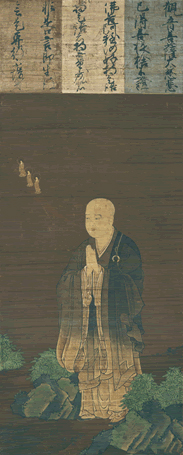
Back Shandao French Shandao ID 善導 Japanese Shandao Polish Шаньдао Russian Shan-tao Swedish Thiện Đạo Vietnamese 善导 Chinese
Shandao | |
|---|---|
善導 | |
 Shandao, Muromachi period, Ōtani University Museum. | |
| Personal | |
| Born | 613 |
| Died | 681 (aged 67–68) |
| Religion | Buddhism |
| Nationality | Chinese |
| School | Pure Land Buddhism |
| Lineage | 2nd generation |
| Notable work(s) | Commentaries on the Amitāyurdhyāna Sūtra |
| Dharma names | Shandao |
| Organization | |
| Temple | Wuzhen Temple Xuanzhong Temple Wenguo Temple Fengxian Temple |
| Senior posting | |
| Teacher | Mingsheng (明勝) Daochuo |
Students
| |
| Part of a series on |
| Buddhism |
|---|
 |
Shandao (simplified Chinese: 善导大师; traditional Chinese: 善導大師; pinyin: shàndǎo dàshī; Japanese: Zendō; 613–681) was a Chinese Buddhist scholar monk and an influential figure of East Asian Pure Land Buddhism.[1] Shandao was the first Pure land author who outright stated that ordinary people can be reborn in the Pure Land primarily by relying on the power of Amitābha Buddha's vows.[1] Due to this, several modern scholars consider Shandao to be the true founder of Chinese Pure Land.[1][2] According to Alfred Bloom, Shandao "systematized Pure Land thought and brought it to its highest peak of development in China."[2] Shandao was also the first Pure Land author to state that mere oral recitation of Amitabha's name was sufficient for rebirth in the Pure Land.[2][3]
Shandao's writings had a strong influence on later Pure Land masters, including the Japanese pure land founders Hōnen and Shinran. In Jōdo Shinshū, he is considered the Fifth Patriarch, while in Chinese Pure Land Buddhism, he is considered the second patriarch after Lushan Huiyuan.
© MMXXIII Rich X Search. We shall prevail. All rights reserved. Rich X Search